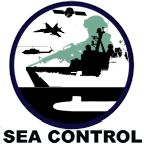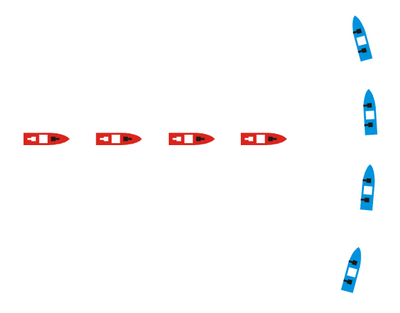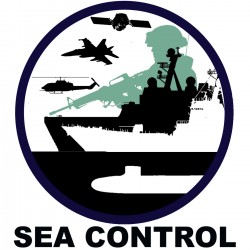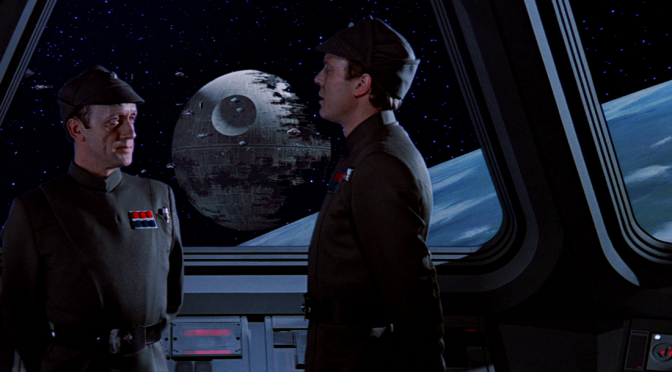 Ever wonder what is happening in the Arctic? Sea Control: North America host Matthew Merighi interviews three graduate students running the Fletcher School of Law and Diplomacy’s annual Arctic Conference: Molly Douglass, Rabia Altaf, and Drew Yerkes. The interview examines border claims, resource politics, and how the various regional actors are approaching this new frontier.
Ever wonder what is happening in the Arctic? Sea Control: North America host Matthew Merighi interviews three graduate students running the Fletcher School of Law and Diplomacy’s annual Arctic Conference: Molly Douglass, Rabia Altaf, and Drew Yerkes. The interview examines border claims, resource politics, and how the various regional actors are approaching this new frontier.
Tag Archives: Navy
Ulysses S. Grant at Endor
Written by Matthew Merighi for Movie Re-Fights Week
The Battle of Endor was the ultimate confrontation in the original Star Wars trilogy. It was a two-pronged battle both in space and on the surface of Endor. Each was a desperate race against time; the Rebel Fleet desperate holding out against the Imperial Fleet backed by a fully armed and operational Death Star laser while a strike team battled a full Imperial Legion defending the Death Star shield generator. We all know how the story ends: the plucky Rebels manage to overcome the Legion through successful use of indigenous forces and coalition warfare, allowing the Rebel Fleet to destroy the Death Star from the inside. The Death Star explodes, the evil Emperor dies, and the galaxy is finally free of tyranny. The end.
[otw_shortcode_button href=”https://cimsec.org/buying-cimsec-war-bonds/18115″ size=”medium” icon_position=”right” shape=”round” color_class=”otw-blue”]Donate to CIMSEC![/otw_shortcode_button]
While this makes for good cinematography, it makes for poor understanding of military strategy. As the television show Robot Chicken points out, there is no reason why the Rebels should have won that battle even once the Death Star was destroyed. The Imperial Fleet was still very much intact, though down a Super Destroyer, and could have prevailed in a protracted conventional engagement. Moreover, the Emperor’s initial strategy to hold the Imperial Fleet in reserve in order to demonstrate the Death Star’s power and fuel Skywalker’s despair in his fall to the Dark Side was clumsy at best. Palpatine demonstrated what happens if you do not pay attention during strategy classes.
In crafting a better strategy at Endor, the Empire could have turned to a figure from American military history: Ulysses S. Grant. For our historically impaired audience, General Grant was the commander of Union forces during the American Civil War who distinguished himself through quasi-Soviet strategy of using superior manpower to slowly grind down the Confederacy until it surrendered. He is one of the best examples of a successful attrition-based approach to strategy and tactics. He followed the dictum that “quantity has a quality of its own.”

The Union’s Grand Army of the Republic (double entendre intended) exhibited the same characteristic as the Imperial Fleet: it was larger and better outfitted but less ably manned and led than its Rebel counterpart. This did the Union no favors in the early phase of the Civil War. President Abraham Lincoln fired Grant’s predecessor, George McClellan, for failing to act aggressively with the Union’s numeric advantage. “If General McClellan isn’t going to use his army,” Lincoln fumed, “then I would like to borrow it for a time.”
If Grant was directing operations at Endor, he would immediately engage the Rebel Fleet. He had enough numbers to overwhelm the Rebel Fleet early while they were still processing the trap the Empire laid. He also had optimal field position. The Rebel Fleet was trapped on three sides by the Death Star, Endor, and the Imperial Fleet. The Rebels were also strung out in a long column while the Imperial Fleet was in a broad line. Imperial Star Destroyers, with their superior armaments and optimization for firing at targets to their front, “crossed the T” and pummeled the ships in the Rebel vanguard before the heavy cruisers in the rear could get into good firing range.

Grant’s approach does have a downside: the risk of a Pyrrhic victory. The Imperial Fleet is not just a warfighting tool; it is also a tool of domestic policing. The Empire is held together through fear of the Imperial Fleet, so conventional losses at Endor could have been a political disaster when coupled with Emperor Palpatine’s death. Grant would have accepted those risks and proceeded with his strategy. He would have reasoned that, despite the short-term challenges of replacing losses, the Rebels would have much more difficulty recovering from such a slugfest than the Empire would. Grant might also have reasoned that it would be much easier to bind together a government by NOT being a pro-human racist or building giant planet-killing superweapons that would ruin the galactic economy but that is neither here nor there.
Remember strategists: focus on your most important objectives, use your advantages wisely, and don’t be afraid to take risks. If you do, you too might defeat the Rebel Fleet one day.
Matthew Merighi is CIMSEC’s Director of Publications. He is a Masters of Arts candidate at the Fletcher School of Law and Diplomacy at Tufts University. He is also a proud Star Wars nerd.
[otw_shortcode_button href=”https://cimsec.org/buying-cimsec-war-bonds/18115″ size=”medium” icon_position=”right” shape=”round” color_class=”otw-blue”]Donate to CIMSEC![/otw_shortcode_button]
Sea Control 103 – CRIC Fleet Battle School on Midrats
 This week, we jumped on the Midrats podcast with Chris Kona and Paul Vebber to discuss the CNO Rapid Innovation Cell Fleet Battle School project – which is now available for those interested in the beta test. With CDR Salamander at the helm, we discuss the history, purpose, and mechanics of the project and the drive to make a mobile game that is fun, educational, and embodies/tests core naval warfighting concepts and capabilities.
This week, we jumped on the Midrats podcast with Chris Kona and Paul Vebber to discuss the CNO Rapid Innovation Cell Fleet Battle School project – which is now available for those interested in the beta test. With CDR Salamander at the helm, we discuss the history, purpose, and mechanics of the project and the drive to make a mobile game that is fun, educational, and embodies/tests core naval warfighting concepts and capabilities.
Videos:
Installation Instructions (with download links)
Gameplay 1
Gameplay 2
Theater ASW Scenario
DOWNLOAD: Fleet Battle School on Midrats
[otw_shortcode_button href=”https://cimsec.org/buying-cimsec-war-bonds/18115″ size=”medium” icon_position=”right” shape=”round” color_class=”otw-blue”]Donate to CIMSEC![/otw_shortcode_button]
Sea Control 102 – The North Korea Challenge
 Professor Sung-Yoon Lee, Assistant Professor at the Fletcher School of Law and Diplomacy, joins Matthew Merighi of Sea Control North America . In this episode, Professor Lee talks about North Korea, its nuclear program, and the broader politics of East Asia. He gives a candid view of the Hermit Kingdom and how the United States and the international community can deal with its emergent challenge.
Professor Sung-Yoon Lee, Assistant Professor at the Fletcher School of Law and Diplomacy, joins Matthew Merighi of Sea Control North America . In this episode, Professor Lee talks about North Korea, its nuclear program, and the broader politics of East Asia. He gives a candid view of the Hermit Kingdom and how the United States and the international community can deal with its emergent challenge.
DOWNLOAD: The North Korea Challenge
Music: Sam LaGrone
Production: Matt Merighi


